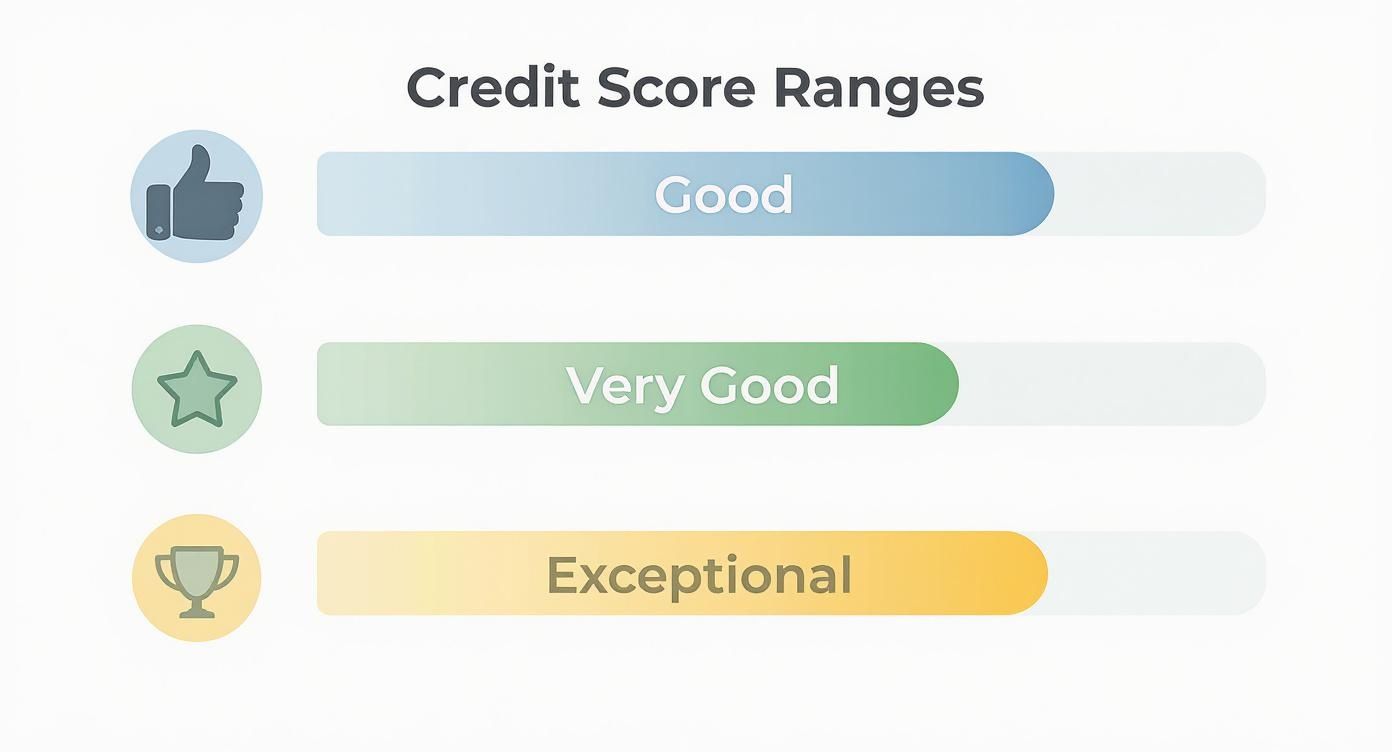Ever wonder what that three-digit number landlords and lenders are so interested in actually means? Think of your credit score as your financial reputation boiled down to a single number—it’s a quick snapshot that tells them how reliably you've managed debt in the past.
Generally, a good credit score on the widely used FICO model lands somewhere between 670 and 739. Hitting this range is a strong signal to landlords and banks that you're a responsible borrower they can trust.
What Is a Good Credit Score, Really?
Your credit score isn't just an arbitrary number. It’s a carefully calculated summary of your financial habits, translated into a universal language that lenders understand. A higher score means you're seen as a lower risk, which can open doors to better interest rates, higher credit limits, and, of course, that dream apartment you've been eyeing.
The most common scoring model you'll encounter is the FICO Score, which runs on a scale from 300 to 850.
While the "good" range is a fantastic milestone, scores are actually broken down into several different tiers. Each tier tells a slightly different story about your credit history. According to recent data from Experian, while 21% of Americans have a score in the 'Good' range, an impressive 71% have scores that are considered good or even better.
Your credit score is one of the most powerful tools in your financial life. It influences the cost of borrowing money for major purchases like a car or home and can even affect your ability to rent an apartment.
To help you see where you might fall on the spectrum, here’s a quick breakdown of the standard FICO score ranges.
Credit Score Ranges At a Glance
This table lays out the common FICO credit score tiers, what they're called, and what they signal to lenders.
| Score Range | Rating | Lender Perception |
|---|---|---|
| 800-850 | Exceptional | You're a top-tier borrower, representing the lowest possible risk. |
| 740-799 | Very Good | You are seen as a dependable borrower and will likely be approved. |
| 670-739 | Good | You are an acceptable risk and should qualify for most standard loans. |
| 580-669 | Fair | Lenders see you as a subprime borrower, which means higher risk. |
| 300-579 | Poor | You represent a significant risk, making loan or rental approvals difficult. |
Knowing where you stand is the first step. Whether you're in the "Exceptional" club or working your way up from "Fair," understanding these ranges helps you know what landlords and lenders see when they look at your score.
How Your Credit Score Is Actually Calculated
Ever wonder where that three-digit number comes from? It’s not just plucked out of the air. Your credit score is a direct reflection of your financial behavior, calculated using a specific formula. Think of it like a report card for your finances—a summary of how you’ve handled money in the past.
The most common formula comes from FICO, which uses five key "ingredients" to cook up your score. Getting a handle on these components is the first step to taking control of your credit.
The Five Key Ingredients of Your Score
Not all financial actions are created equal. Some parts of your credit history carry a lot more weight than others. By understanding the recipe, you can focus your efforts where they'll make the biggest difference.
Here’s exactly how it breaks down:
-
Payment History (35%): This is the heavyweight champion of your credit score. Do you pay your bills on time, every time? A solid track record of on-time payments is the single best way to prove you're a low-risk borrower.
-
Amounts Owed (30%): This factor looks at how much debt you're carrying. A key part of this is your credit utilization ratio—that's the percentage of your available credit you're currently using. Keeping this low shows you aren't overextended.
-
Length of Credit History (15%): Time is on your side. A longer history of responsible borrowing generally leads to a better score. It gives lenders more data to see that you're reliable.
-
New Credit (10%): This one's about how often you apply for new credit. Opening a bunch of new accounts in a short time can look risky, as it might suggest you're in financial trouble.
-
Credit Mix (10%): Lenders like to see that you can successfully manage different kinds of debt, such as a mix of credit cards (revolving credit) and an auto or student loan (installment credit).
This chart gives you a great visual of the score ranges and what they mean.

As you can see, a "Good" score is a solid target for most apartment hunters. Anything in the "Exceptional" range tells a landlord you're a top-tier applicant.
If you want the biggest bang for your buck, focus on the two most important ingredients: paying bills on time and keeping your credit card balances low. Together, these two habits account for a whopping 65% of your entire score. Nail those, and you're well on your way.
Why a Good Credit Score Unlocks Financial Doors
Think of your credit score as your financial reputation, boiled down to a three-digit number. It's not just for bankers and lenders; it’s a key that can unlock better deals, bigger opportunities, and serious savings across the board. When you have a strong score, companies see you as a reliable and trustworthy customer, which makes them much more willing to work with you.
The most obvious perk? Lower interest rates. We're talking about the kind of savings that can add up to thousands of dollars over the life of a car loan or mortgage. A few points on your score can be the difference between a manageable monthly payment and one that really strains your budget.

More Than Just Loans
But the impact of your credit score reaches far beyond borrowing money. It quietly influences a surprising number of other financial areas, often in ways you wouldn't expect.
- Cheaper Insurance: Believe it or not, many insurers use credit-based scores to help set your car and home insurance premiums. A higher score often suggests lower risk, which can lead to lower rates.
- Avoiding Utility Deposits: When you're setting up new services for electricity, water, or internet, a solid credit history can often help you skip paying a hefty security deposit upfront.
- Access to Premium Credit Cards: Those top-tier rewards cards with amazing cash-back offers, travel points, and airport lounge access? They're almost always reserved for people with good to excellent credit.
Your credit score is one of your most powerful financial assets. The difference of just a few points can mean getting the keys to that perfect apartment, landing a car loan you can actually afford, or qualifying for the best financial products out there.
A strong credit history is also a massive advantage when you're navigating the housing market, whether you're trying to buy a house or just land a competitive rental. It gives you more options and a lot more bargaining power. In fact, global trends show that people with good credit scores are more likely to buy or refinance property. This connection makes your score a vital indicator of your overall financial strength.
What Credit Score Do I Need to Rent an Apartment?
When you're apartment hunting, your credit score is the first financial handshake you have with a potential landlord. Think of it from their perspective: they're not just looking for someone to fill a vacant unit. They're looking for a reliable tenant who will pay the rent on time, every single month. A quick credit check is their go-to tool for gauging your track record with managing money.
So, what’s the magic number? While it can vary, most landlords and property management companies are hoping to see a credit score of 650 or higher. A score in this range sends a clear signal that you have a history of paying your bills on time, which is exactly the kind of reassurance they need.
Landing in that sweet spot suggests you're a low-risk applicant. On the flip side, a score below 650 can raise a red flag, making them wonder if you'll be able to handle your rent payments consistently.
What If My Credit Score Is Low?
First off, don't panic if your score isn't perfect. A lower credit score doesn't automatically slam the door on your apartment search. It just means you’ll need to put in a little extra effort to prove you’re a trustworthy tenant.
A low credit score is a hurdle, not a roadblock. By proactively addressing it, you can show a landlord that you are more than just a number and are serious about being a great tenant.
Here are a few solid strategies that can strengthen your application and help you stand out:
- Offer a Larger Security Deposit: Putting down more money upfront is a great way to reduce the landlord's perceived risk. It shows you're financially serious and have cash on hand.
- Find a Co-Signer: This is a classic move for a reason. A co-signer, often a parent or a trusted relative with a strong credit history, essentially guarantees the rent will be paid if you can't cover it.
- Show Proof of Savings: Sometimes a credit score doesn't tell the whole story. By providing bank statements that show a healthy savings account, you can demonstrate financial stability and ease a landlord's concerns.
Understanding what landlords are looking for in a credit score for an apartment rental helps you prepare a winning application. And as you get your finances in order, a good moving to another state checklist can help you manage all the other moving parts of your big move.
Taking Steps to Build and Improve Your Credit
Knowing what a good credit score is one thing, but actually building it is how you take the wheel of your financial future. The good news is that improving your score isn't about some secret financial trick; it's all about developing simple, consistent habits that really pay off down the road. I like to think of it like physical fitness—small, regular efforts are what produce the biggest results.
The single most important thing you can do is pay every single bill on time. Your payment history is the heavyweight champion of credit scoring, making up a massive 35% of your FICO score. Just one late payment can cause a serious dip, so setting up automatic payments is a fantastic way to make sure you never miss a due date.

Developing Smart Credit Habits
After on-time payments, the next big piece of the puzzle is how you manage the credit you already have. These habits directly impact the "Amounts Owed" category, which accounts for another 30% of your score.
-
Keep Your Balances Low: A great rule of thumb is to use less than 30% of your available credit on any card. So, if you have a card with a $5,000 limit, you should try to keep the balance under $1,500. This is called your credit utilization ratio, and a lower number always looks better to lenders.
-
Don't Close Your Oldest Accounts: A long, established credit history shows that you're a reliable borrower. Even if you rarely use an old credit card, keeping that account open helps increase the average age of your accounts, which gives your score a nice little boost.
It's also smart to resist opening a bunch of new accounts all at once. Every time you apply for credit, it creates a "hard inquiry" on your report, which can temporarily knock your score down a few points. Spacing out your applications shows lenders you're not in a tight spot for cash.
If you want to dig a little deeper, our guide on how to build credit score lays out even more strategies to get you started. By putting these simple steps into practice, you’ll be well on your way to a healthier financial profile and that dream apartment.
Common Questions About Credit Scores
As you start digging into the world of credit, you'll probably run into a few myths and nagging questions. Let's clear up some of the most common ones so you can feel totally in control of your financial health.
How Long Does It Take to Build a Good Credit Score?
Building a good credit score from the ground up is definitely a marathon, not a sprint. You'll need at least six months of consistent, reported credit activity just for a FICO score to even be generated.
Getting into that "good" range of 670 or higher takes time—think a few years of solid, responsible habits. The secret ingredients are patience and a consistent track record of paying your bills on time, every time.
Will Checking My Own Credit Score Lower It?
This is one of the biggest myths out there, but the answer is a firm no. When you check your own credit, it’s called a "soft inquiry," and it has zero impact on your score. Feel free to check it as often as you want.
A "hard inquiry" is different. That’s when a lender pulls your credit report because you've applied for something like a new loan or credit card. That can cause a small, temporary dip in your score.
It's not just a good idea to check your credit report regularly; it's essential for your financial health. Monitoring your report helps you track your progress and spot any signs of potential fraud or errors early on.
Staying vigilant is your best defense. This is especially true if you find yourself in a tight financial spot, so it pays to know how to dodge fraudsters when you're in financial distress.
What Is the Difference Between FICO and VantageScore?
You'll see these two names everywhere: FICO and VantageScore. They're the two heavyweights in the credit scoring game. While both use the information in your credit reports to predict how likely you are to repay debt, they have a few key differences.
- Their Formulas: They use slightly different mathematical models, so they might weigh things like your payment history or credit usage a little differently.
- Who Uses Them: FICO has been around longer and is still the go-to for most lenders, especially for big decisions like mortgages.
- Where You See Them: Many of the free credit monitoring services you use online often show you a VantageScore.
Think of it like this: two different teachers are grading the same essay. They’re both looking at the same information, but they might give you a slightly different final score based on what they prioritize.
Ready to find an apartment that values your responsible financial habits? At Cynthia Gardens, we offer serene, comfortable living in the heart of Boca Raton. Check out our available one-bedroom apartments today and discover your new home at https://cynthiagardens.com.
